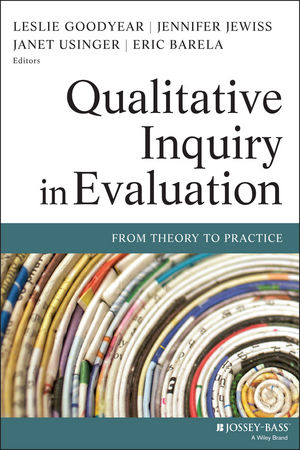Hello from snowy Boston! I’m Leslie Goodyear, one of the co-leaders of the Qualitative Methods TIG, and a co-editor, with Jennifer Jewiss, Janet Usinger and Eric Barela, of a new book about qualitative evaluation called Qualitative Inquiry in Evaluation: From Theory to Practice (2014, Jossey-Bass).
When I was a new evaluator, I had a major “a-ha experience” while interviewing a group of women who participated in an HIV/AIDS training for parents. They were bilingual Spanish-English speakers, and I was definitely the least fluent in Spanish in the room. As they discussed ways in which HIV could be transmitted, one woman referred to a specific sexual activity in Spanish, and all the others laughed and laughed. But I didn’t know for sure what they meant; I had an idea, but I wasn’t sure. Of course, I laughed along with them, but wondered what to do: Ask for them to define the term (and break the momentum)? Go with the flow and not be sure what they were talking about? Well, I decided I’d better ask. When I did, and the woman said what she meant, another woman said, “Oh, no! That’s not what it means!” She went on to explain, and the next woman said she thought it meant something else. And on and on with each woman! It turns out that none of them agreed on the term, but they all thought they knew what it was.
Lesson Learned: Ask stupid questions! I was worried I would look stupid when I asked them to explain. But in fact, we all learned something important in discussing the term, but also in talking about how we can think we all agree on something, but if it’s not clarified, we can’t know for sure.
Lesson Learned: Putting aside ego and fear are critical to getting good information in qualitative evaluation. Often, stupid questions open up dialogue and understanding. Sometimes they just clarify what’s being discussed. Other times, even though you might already know the answer, they give participants an important opportunity to share their perspectives in greater depth.
 Rad Resource: More stories about being in the trenches of qualitative inquiry in evaluation, and asking stupid questions, can be found in the final chapter of our new book, Qualitative Inquiry in Evaluation: From Theory to Practice (2014, Jossey-Bass).
Rad Resource: More stories about being in the trenches of qualitative inquiry in evaluation, and asking stupid questions, can be found in the final chapter of our new book, Qualitative Inquiry in Evaluation: From Theory to Practice (2014, Jossey-Bass).
The American Evaluation Association is celebrating Qualitative Evaluation Week. The contributions all this week to aea365 come from evaluators who do qualitative evaluation. Do you have questions, concerns, kudos, or content to extend this aea365 contribution? Please add them in the comments section for this post on the aea365 webpage so that we may enrich our community of practice. Would you like to submit an aea365 Tip? Please send a note of interest to aea365@eval.org. aea365 is sponsored by the American Evaluation Association and provides a Tip-a-Day by and for evaluators.
